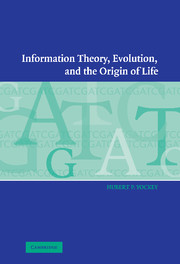Book contents
- Frontmatter
- Contents
- Preface
- 1 The genetic information system
- 2 James Watson, Francis Crick, George Gamow, and the genetic code
- 3 The Central Dogma of molecular biology
- 4 The measure of the information content in the genetic message
- 5 Communication of information from the genome to the proteome
- 6 The information content or complexity of protein families
- 7 Evolution of the genetic code and its modern characteristics
- 8 Haeckel's Urschleim and the role of the Central Dogma in the origin of life
- 9 Philosophical approaches to the origin of life
- 10 The error catastrophe and the hypercycles of Eigen and Schuster
- 11 Randomness, complexity, the unknowable, and the impossible
- 12 Does evolution need an intelligent designer?
- 13 Epilogue
- Mathematical appendix
- Glossary
- References
- Index
1 - The genetic information system
Published online by Cambridge University Press: 15 August 2009
- Frontmatter
- Contents
- Preface
- 1 The genetic information system
- 2 James Watson, Francis Crick, George Gamow, and the genetic code
- 3 The Central Dogma of molecular biology
- 4 The measure of the information content in the genetic message
- 5 Communication of information from the genome to the proteome
- 6 The information content or complexity of protein families
- 7 Evolution of the genetic code and its modern characteristics
- 8 Haeckel's Urschleim and the role of the Central Dogma in the origin of life
- 9 Philosophical approaches to the origin of life
- 10 The error catastrophe and the hypercycles of Eigen and Schuster
- 11 Randomness, complexity, the unknowable, and the impossible
- 12 Does evolution need an intelligent designer?
- 13 Epilogue
- Mathematical appendix
- Glossary
- References
- Index
Summary
Socrates: Every sort of confusion like these is to be found in our minds; and it is this weakness in our nature that is exploited, with a quite magical effect, by many tricks of illusion, like scene-painting and conjuring.
Glaucon: True.Socrates: But satisfactory means have been found for dispelling these illusions by measuring, counting and weighing. We are no longer at the mercy of apparent differences of size and quantity and weight; the faculty which has done the counting, measuring or weighing takes control instead. And this can only be the work of the calculating or reasoning element in the soul.
The Republic, Book X, Plato (428–348 b.c.), translated by Francis M. Cornford, Oxford University Press.Expressing knowledge in numbers
Socrates (The Republic, Book VI, p.745) had noted, in an earlier conversation with Glaucon, that students of geometry and reckoning first set up postulates appropriate to each branch of science, treating them as known absolute assumptions, taking it for granted that they are obvious to everybody. Thus, as Socrates taught us, the essence of science is measuring, counting, and weighing together with reasoning from postulates or axioms. This breaks molecular biology out of sophisticated Just So Stories (Kipling, 1902) into the quantitative mode, used by natural scientists (Gamow, 1954; Wolynes, 1998).
Hermann Rorschach (1884–1922), a Swiss psychiatrist, analyzed the interpretations, by his subjects, of ten standard inkblots to probe their thoughts.
- Type
- Chapter
- Information
- Publisher: Cambridge University PressPrint publication year: 2005

